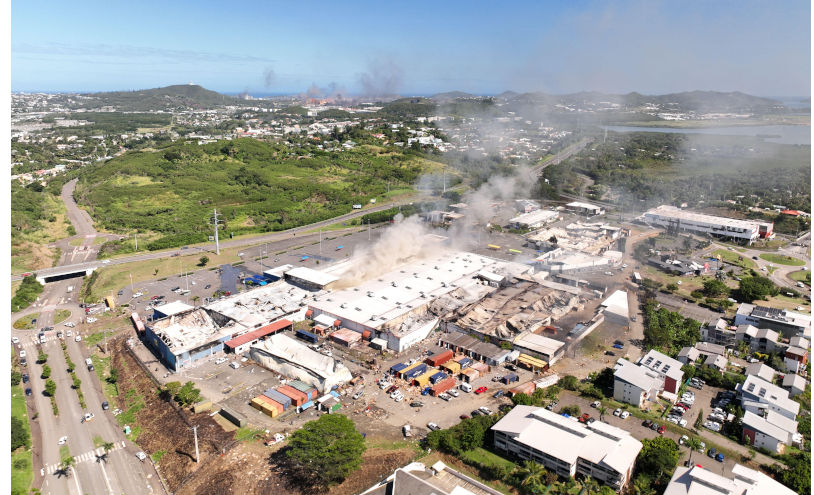The claim by Paris officials that ‘foreign interference’ is behind the civil turmoil in New Caledonia not only attempts to deflect responsibility from France for the crisis but is also an insult to the Kanak peoples’ long struggle for independence.
The French Minister of the Interior’s claim that Azerbaijan is stoking the violence denies agency to the peoples’ struggle and ignores the French National Assembly’s recent efforts to alter the territory’s electoral roll. It is enabled by a Western narrative that sees the Pacific as a kind of political ‘terra nullius’ vulnerable to malign ‘foreign actors’ like China, Russia and now Azerbaijan. The US, Australia and, yes, France, argue that their aim is to counter these threats, to keep the Pacific ‘family’ democratic and intact. This discourse of political absence is infantilising, patronising, and deeply racist. It reduces the region’s complex, fractious, culturally-embedded politics to a pawn in the play of geo-politics. It is an insult to those who have so long fought for an independent Kanaky.
The French Minister points to a supportive tweet from a spokesperson for the Baku Initiative Group, formed after a group of Kanaks attended a conference on decolonisation in Azerbaijan, as evidence that rioters are being egged on by foreign forces. But in the context of New Caledonian pro-independence politics, the tweet was hardly controversial. The United Nations continues to list New Caledonia as a non-self-governing territory yet to exercise its right to self-determination, and Kanak militants have long pointed to the link between colonialism and civil unrest. So why is this tweet being cited as evidence of foreign incitement to violence?
Simply put, from the French Government’s perspective, it is better to blame someone else. France has governed the Territory since its inception in 1853, initially as a penal colony and then as more and more French were encouraged to migrate, a settler society where the numbers of indigenous Kanaks and settlers were roughly in balance, but where Kanaks were progressively marginalised. The Kanak peoples’ aspiration to have their land back has endured throughout and formalised as a political movement in the early 1970s. Frustrated by a lack of progress towards self-determination, widespread violence erupted in the 1980s. The French Government scrambled to quell the situation, and did what France does best. It invited the parties to Paris for talks (sound familiar?), lavished the Territory with money, and made some concessions towards limited forms of self-government.
A significant part of the political ‘settlement’ expressed in two remarkable documents of reconciliation, the Matignon Agreements (1988), and the Noumea Accords (1998), was new opportunities for political participation by Kanak leaders. A timetable was set for referendums on independence and the Kanak politicians set about demonstrating their capacity as leaders and economic managers. The Territory Government has for a long time been led mostly by pro-independence parties, and the first two referendums on self-determination (in 2018 and 2020) showed growing, but not majority, support for independence. The third referendum (2021) was boycotted by pro-independence groups which argued that its timing disrespected COVID-related Kanak mourning rituals. That’s when the cracks on the political surface began to appear.
Of course, the substrate of New Caledonian society was fracturing well before this. The emergence of a Kanak political and economic elite was not matched by improvement in the lives of most Kanaks, particularly the young who could not find work, in spite of moving to shanty towns on the periphery of Noumea. France was lavishing huge sums of money on the Territory, which served to exacerbate the racial and economic divide. The palpable presence of inequality can be seen by driving from the international airport through an underdeveloped countryside and shanty towns, to the ritzy beach-side suburb of Anse Vata, past the sprawling nickel smelter on the out-skirts of Noumea, and then on to suburbs that glisten with affluence—and whiteness. In the current violence, residents barricade the entrance to their suburbs which attests to their exclusivity. The geographical demography of Noumea speaks to the prevailing economic and cultural apartheid. Moreover, racism remains a sore that refuses to heal no matter how much Kanak leaders demonstrate their competence, or the French Government throws at programs to address disadvantage. White people frequently claim that they are not racist, that they have good Kanak friends, that they are even married to a Kanak. But racism in the French context expresses itself in its disavowal of cultural difference, not so much skin colour. Isn’t this what the pro-independence Kanaks seek to assert in the way they preside over their land—their cultural difference?
President Macron visited New Caledonia in July 2023 to try to quell the anger of the pro-independence movement resulting from his government’s refusal to postpone the third referendum. This mediator on the world stage—who hosts the Chinese President, retains a line of communication with Russia, pushes the boundaries in suggesting that NATO consider becoming directly involved in the war in Ukraine—probably thought that his visit could work some political magic. The charm offensive obviously has not. His government’s move to change the eligibility for the electoral roll in the Territory—a change that would give an additional 25,000 settlers the vote, and mean that the Kanak people could probably say goodbye to independence—attests to how tone deaf the French political establishment is. Well-worn strategies like pouring more money into the Territory, inviting its factions to meetings in Paris, are unlikely to achieve anything unless the Kanak people are given a clear pathway to independence. Blame Azerbaijan all you like, it will only fuel further unrest through its mockery of the determination of the Kanak peoples in their own right to fight for independence.
Alaine Chanter
Dr Alaine Chanter is a former academic in Politics and Cultural Studies at the University of Canberra. One of her main areas of research was the independence struggle in the French Pacific, particularly New Caledonia.
